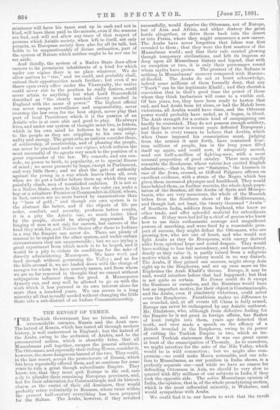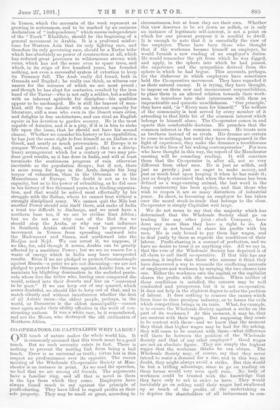THE REVOLT OF YEMEN. T HE Turkish Government has no friends,
and two irreconcilable enemies, Russia and the Arab race. The hatred of Russia, which has lasted all through modern history, is well understood in England; but the hatred of the Arabs, owing to the seclusion of Arabia, and to the preconceived notion, which is absurdly false, that all Mussulmans pull together, escapes the general attention. The Ottomans, and especially their ruling House, consider it, however, the more dangerous hatred of the two. They could, in the last resort, accept the protectorate of Russia, which has been repeatedly offered them, and so continue for some years to rule a great though subordinate Empire. They know, too, that they must quit Europe in the end, care o aly to plunder their remaining European provinces, and, but for their admiration for Constantinople and its historic charm as the centre of their old dominion, they would probably retire voluntarily to Broussa, where twice within the present half-century everything has been prepared for the Sultan. The Arabs, however, if they revolted successfully, would deprive the Ottomans, not of Europe, but of Asia and Africa, and either destroy the great horde altogether, or drive them back into the desert or into Persia, where they might commence a new career. The Arabs have never forgotten that Islam was first revealed to them ; that they were the first masters of the Mussulman world; and that their rule created glowing though temporary civilisations, and left its impress so deep upon all Mussulman history and legend, that with an exception or two, it is only their personages round whom myths have grown. The greatest of the Sultans is nothing in Mussulmans' memory compared with Haroun- al-Rashid. The Arabs do not at heart acknowledge, indeed some millions of them formally deny, that any " Toork " can be the legitimate Khalif; and they cherish a conviction that in God's good time the power of those whom they think barbarians will come to a visible end.
Of late years, too, they have been ready to hasten that end, and had Arabi been let alone, or had the Maldi been victorious, all Arabia would have risen, and the Ottoman power would probably have ended, as it began, in blood. The Arab strength for a certain kind of campaigning can hardly be overrated. They do not possess enough artillery, and they have never in recent years defeated Europeans ; but there is every reason to believe that Arabia, which when Omar imposed his conscription must, judging from the armies it sent forth, have contained four- teen millions of people, has in the long peace filled itself up again, and could now, if adequately moved, send out half-a-million of fighting-men, with a most unusual proportion of good cavalry. These men exactly resemble the Soudanese, whose valour has excited English admiration,—that is, they are " Safacens," the kinsmen in race of the Jews, crossed, as Gifford Palgra,ve affirms on excellent evidence, with a strain of the Negro, which has given them increased physique and hardihood. They would have behind them, as further recruits, the whole Arab popu- lation of the Soudan, all the Arabs of Syria and Mesopo- tamia, who are very numerous, the whole of the Moorish tribes from the Southern shore of the Mediterranean, and though last, not least, the twenty thousand " Arabs " of Southern India, soldiers from boyhood, who know no other trade, and offer splendid material for subordinate officers. If they were but led by a chief of genius who knew how to use their enthusiastic courage and magnificent powers of marching, and were fired by a reasonable pros- pect of success, they might defeat the Ottomans, who are growing few, who are out of heart, and who would not fight Arabs as they do Europeans, with energy derived alike from spiritual hope and social despair. They would have nothing to lose but ascendency, and their ascendency, dearly as they value it, is partly valued from a religious motive which an Arab victory would in no way disturb. The Arabs, if they gained one success, might sweep Asia right up to the Bosphorus, and set up once more on the Euphrates the Arab Khalif's throne. Europe, it may be said, would interfere before that had happened; but that is not quite so certain. No Power could do it except the Russians or ourselves, and the Russians would have but an imperfect motive, for their object is Constantinople, and the Arabs, even if absolutely victorious, could never cross the Bosphorus. Fanaticism makes no difference to an ironclad, and, at all events till China is fully armed, Europe can never be endangered by any Asiatic outburst. Mr. Gladstone, who, although from defective feeling for the Empire he is not great in foreign affairs, has flashes of keen insight into them, years ago detected that truth, and once made a speech on the efficacy of a British ironclad in the Bosphorus, owing to its power of cutting the Turkish Empire in two, which so im- pressed Turkish statesmen that it was one great cause at least of the emancipation of Thessaly. As to ourselves, we might interfere for the sake of the Nile Valley, which would be in wild commotion ; but we might also com- promise—we could make Mecca untenable, and our rela- tion to Mussulmans, as our position in India shows, is a perfectly separate one—and while we have no reason for defending Ottomans in Asia, we should be .very slow to quarrel with fifty millions of our subjects in India if they took the opposite side. The active Mussulman opinion of India, the opinion, that is, of the whole proselytising section, which is the most influential minority, is Wahabee, and would sympathise with Arabs.
We could find it in our hearts to wish that the revolt in Yemen, which the accounts of the week represent as growing in seriousness, and to be marked by an ominous declaration of "independence," which means independence of the Toork " Khalifate, should be the beginning of a general movement in Arabia. It is a profound misfor- tune for Western Asia that its only fighting race, and therefore its only governing race, should be a Tartar tribe which has absolutely no power of construction at all, which has reduced great provinces to wildernesses strewn with ruins, which has not the sense even to spare trees, and which, in its reign of five hundred years, has founded nothing, not even a successful system of extortion to keep its Treasury full. The Arab really did found, both in Granada and Bagdad ; he really can think, as witness our names for the sciences of which we are most proud ; and though be has slept for centuries, crushed by the iron hand of the Tartar—who is not only a soldier, but a soldier with an inherent aptitude for discipline—his qualities appear to be unchanged. Ile is still the bravest of man- kind, still the one Asiatic with an inherent capacity for literature, still a man who even in the Desert rears cities, and delights in fine architecture, and can rival an English squire in his devotion to garden scenery. He is the most capable of Asiatics, and it is a pity, if it is in him to stake life upon the issue, that he should not have his second chance. Whether we consider his history or his capabilities, he has just the same right to free himself as an Italian or a Greek, and nearly as much provocation. If Europe is to conquer Western Asia, well and good ; that is a discip- linary arrangement which for a century or two may pro- duce good results, as it has done in India, and will at least terminate the continuous progress of ruin otherwise inevitable as the population decays; but if not, there is more room for hope in the Arab, despite his long torpor of exhaustion, than in the Ottoman or in the Mussulmans of Europe. The doubt is not as to his capacity, but as to his 'power of submitting, as he did once in his history of five thousand years, to a binding organisa- tion, and that would be solved most effectually by his struggle with the Sultan, whom he cannot beat without a strongly disciplined army. We cannot quit the Nile lest another Power should seat itself there, and make of India a trust too difficult to discharge, and we must have a northern base too, if we are to civilise East Africa ; but we do not see why east of the Red Sea we should stop the Arabs, or why our vast influence in Southern Arabia should be used 'to prevent the movement in Yemen from spreading eastward into the Hadratnaut and Oman, and northward into the Hedjaz and Nejd. We can arrest it, we suppose, if we like, for, odd though it seems, Arabia can be greatly affected by a maritime Power ; but we see no reason for a waste of energy which in India may have unexpected results. Even if we are pledged to protect Constantinople against Russia—a point we are not discussing—we are not pledged to protect the Ottoman against Asiatic foes, or to maintain his blighting domination in the secluded penin- sula where live the tribes who, having once conquered the world, retired into their deserts and live on contented to be poor." If we can keep out of any quarrel, which seems doubtful, we should like to keep out of that, and to watch silently and without interference whether the first of all Asiatic races—the oldest people, perhaps, in the world, as Damascus is the oldest municipality—cannot once again make their ability effective in the work of con- structing nations. It was a white race, be it remembered, and not the Moors, who destroyed the old civilisation of Northern Africa.



































 Previous page
Previous page